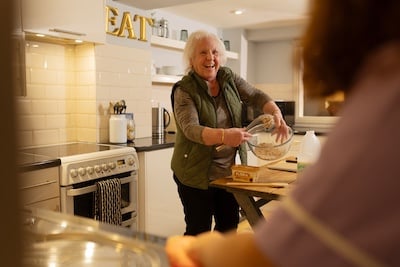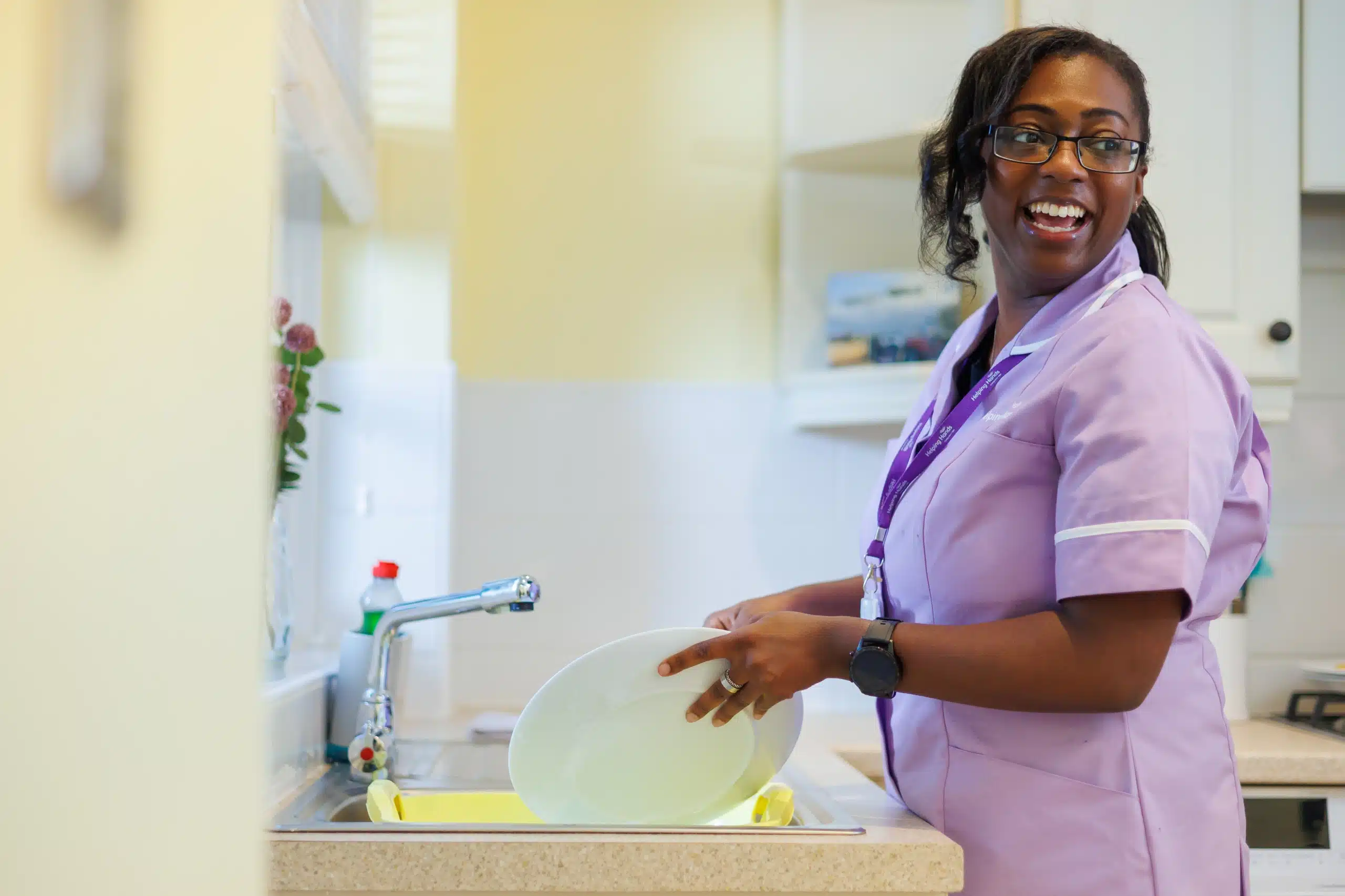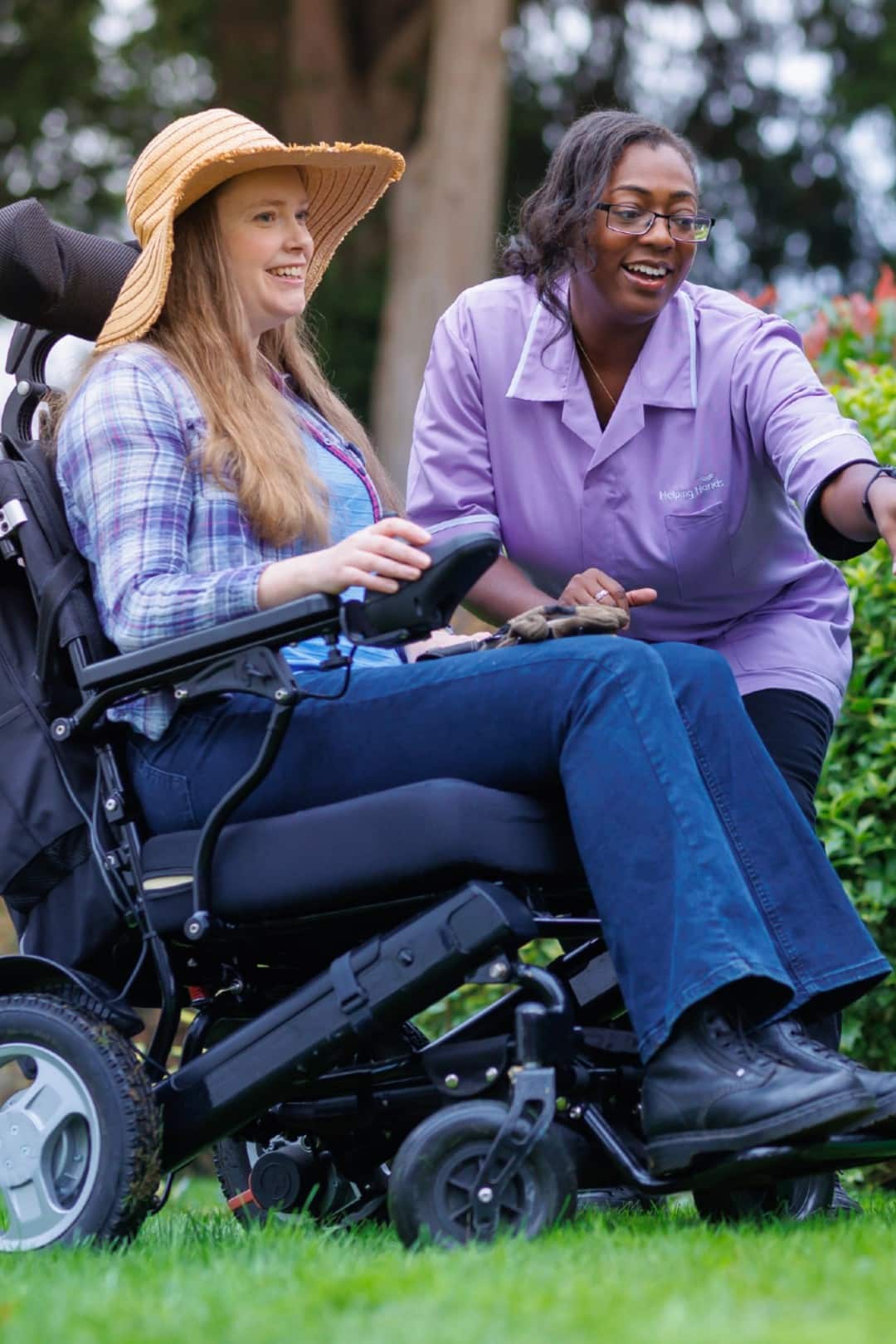What are the Differences Between Domiciliary Care and Home Care?
What is Domiciliary Care?
So many families are opting for domiciliary care – sometimes referred to as hourly care – because it enables them to retain control of the support they receive.
Domiciliary Care is support received in your own home, designed to keep you living independently. Helping Hands has been offering exceptional domiciliary care since we were established in 1989, meaning you get to remain living in the home you love while receiving the help you need. We offer two types of domiciliary care at Helping Hands: visiting care and live-in care, both of which we’ll design around your needs and ensure you receive a bespoke service.
Visiting care is sometimes referred to as hourly care because the caregiver will come to your home and perform support tasks at prearranged times on specific days, typically for an hour or two at a time. This can include housework, meal preparation, and personal care. Live-in care covers the same responsibilities with the added reassurance of someone being in your home around the clock, providing companionship as well as practical support.
We’ve been offering our exceptional brand of care at home since we were established in 1989, meaning we’re trusted across the UK. Our domiciliary and home care services are also fully regulated by the Care Quality Commission and Care Inspectorate Wales.

What is Home Care (Or Live-In Care?)

While there are many similarities between the different types of care and the terms are often used interchangeably, ‘home care’ is regularly used to indicate that a higher level of care is needed than domiciliary care, which often focuses on housekeeping. Home care can, therefore, include nursing care, palliative care, and support with needs such as PEG, stoma and catheter. Home care can be delivered on either a visiting or live-in basis. However, when someone requires around-the-clock support, they often have one or more live-in carers as that ensures a continuity of care at all times.
Key Differences Between Domiciliary Care and Home Care
Domiciliary care and home care share similarities but also marked differences. For instance:
Domiciliary Care
This primarily focuses on domestic tasks, such as housework and preparing meals and on general non-medical assistance, especially companionship. Its primary function is to support a person’s general wellbeing, their comfort and their independence.
Home Care
While still taking care of the practical tasks such as housework and meal preparation, home care also has a broader range of services such as medical care, end-of-life care, rehabilitation, and more complex medical conditions.
Nursing Care
If complex conditions are to be supported, nursing care may be necessary at home. This would fall under a specialised category of home care that sees your care managed by nurses and delivered by nurse-trained carers, such as at Helping Hands.
Palliative Care
If you are on a palliative care journey, you may need additional support with therapies and treatments that your wider healthcare team may have prescribed. Your carer will be able to work as part of this team to deliver whatever you need.
Who Is Best Suited for Domiciliary Care and Home Care?
Whether you think that domiciliary care or home care is best suited to your needs, we will always work closely with you and, where appropriate, your loved ones to design the right package of care. If you are keen to remain in your own home to receive your care – regardless of your needs – we can help to make that happen. Our expertly trained carers are dedicated to making sure you live as well as you possibly can in the home you love, and our industry-leading home care supports thousands of people every day, across England and Wales. Whether you require domiciliary care or home care, visiting or live-in, our consistently high-quality care has seen us become the UK’s most widely trusted home care provider.

The Cost of Domiciliary Care vs Home Care

The costs involved in your home care package will always be tailored to your exact requirements once we have carried out a home care assessment.
We understand it’s useful to have some approximate figures to begin making plans though, but the following should only be taken as a guide until we can work out your bespoke quotation for you, based on your care needs and location.
Visiting Care
We believe that care at home cannot just be measured in pounds and pence. This is because you cannot put a price on being able to remain living in the place you love, your precious home. Visiting care can be very affordable, beginning at just £31.00 per hour, plus a call-out charge per visit of £4.50.
Live-in Care
Live-in care gives you the unique opportunity of knowing that you’re never alone at home, that you’ll have companionship whenever you wish and that all of your practical care needs will be undertaken. Prices for live-in care are competitive, beginning at £1,595 per week for an individual and £1,595 for a couple.
What Kinds of Services Are Available in Hourly Care?
Hourly care will see our expertly trained carers coming to your home at a time and day convenient to you. It offers the reassurance of help with the practical care tasks you may no longer be able to manage, such as housework, laundry, changing beds, and light gardening. Hourly carers are also highly-trained and can undertake more complex care tasks where necessary, such as continence care, personal care, PEG, stoma and catheter care. They’ll prepare food and drink for you and will be able to support your mobility, medication and access to your local community. All in all, hourly care from Helping Hands offers flexible care options that can give your family a break or help you manage your home yourself. You’ll always have care on your own terms with us, helped by highly trained carers who will understand and support the way you wish to live.
